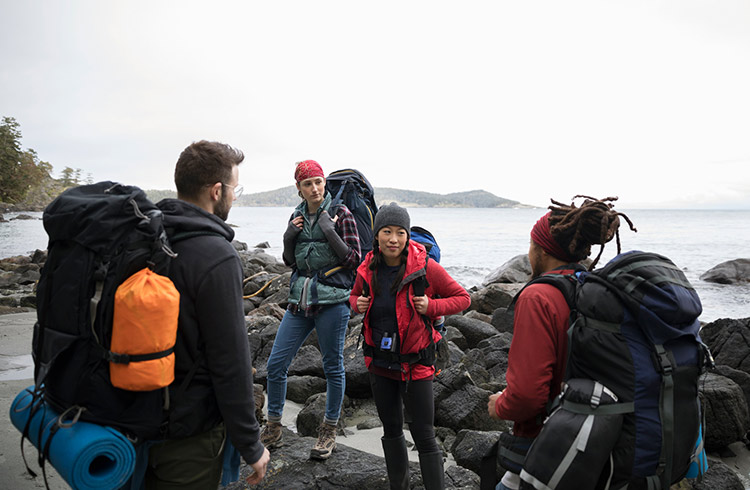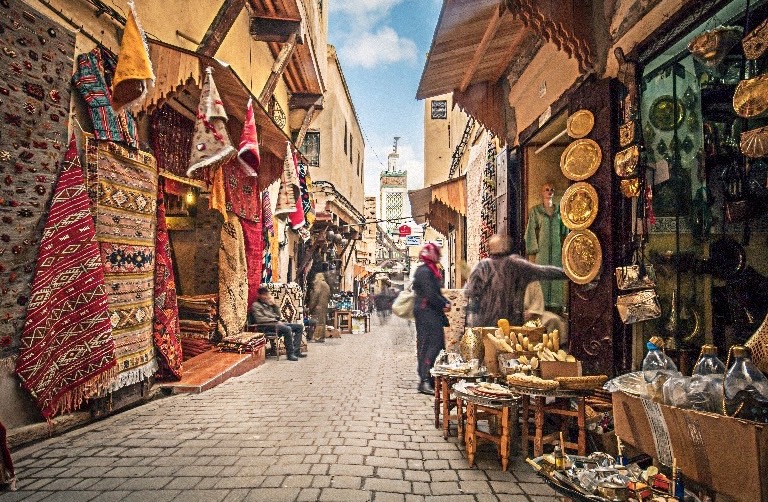9 Essential Traveler Tips For Keeping Your Luggage Safe
How do you stop your bags from being stolen or be tampered with? We share our top tips for keeping your belongings safe while you travel.
 Photo © Getty Images/Hero Images
Photo © Getty Images/Hero Images
There are two stages to keeping your luggage safe: planning the right luggage before you go and using it safely when you're on the road exploring the world.
- Pack and carry your own bags
- Understand quarantine laws
- Get the right gear for your trip
- Always take zip ties for your luggage
- Get the right travel insurance for your trip
- Be prepared to lose stuff
- Never, ever leave your bag unattended
- Keep your valuables with you
- Secure your day-pack
Before you go:
1. Pack and carry your own bags
Know the contents of your bags when you're crossing borders, catching flights or passing through Customs. Don't offer to carry anything for anyone else. This might seem like common sense, but there are many stories of unsuspecting travelers trying to help out their new-found travel companion only to end up carrying something illegal. By all means, make new friends on the road, but let them carry their own stuff.
2. Understand quarantine laws
Be aware of quarantine laws and make sure you're not importing illegal substances – which could be as innocent as fruit or wood carvings – or as sinister as the body parts of endangered animals. In some countries, the penalties are much harsher than a verbal telling off – in Australia for example, you could receive an on-the-spot fine of up to AU $220, or, for a serious offense, you could be prosecuted and face a fine of up to AU $66,000 or 10 years' imprisonment. Ouch.
3. Get the right gear for your trip
Think about how much gear you need to take (trust us, less is more) and then consider how many bags you need. It is much easier to get around and keep an eye on one bag than two.
Take a sturdy bag that's not easy to tamper with and keep it securely locked.
If you are traveling to the United States, make sure your luggage lock is in accordance with their specific baggage lock requirements – these can be opened by security officers using universal "master keys so that your locks don't have to be cut.
Information about these locks is available from the Transportation Security Administration's website.
4. Always take zip ties for your luggage
Although these don't replace a secure lock, sometimes zip ties are incredibly useful for making sure your bags aren't tampered with. You can easily cut them off, but they prevent easy access for opportunists.
Black or white ones are the most common, but you could mix it up a bit with some colors for extra identification.
If your bag arrives on an airport carousel with the cable ties missing or the color combination changed, don't touch the bag, call a security officer over and tell them you think your bag's been tampered with. You'll be subjecting yourself to a thorough search, but if there's any contraband planted in the bag, you'll have a good alibi.
5. Get the right travel insurance for your trip
Lost luggage is very inconvenient, and can be expensive to replace, along with the contents. To ease the pain, make sure you get the right level of insurance cover, especially if you're carrying expensive cameras, laptops or smartphones. Read the policy description all the way through, and check these valuable items will be fully covered.
6. Be prepared to lose stuff
Good, light packing is an art form, but the basic advice is not to pack anything which you couldn't bear to part with, especially sentimental and valuable belongings. But sometimes with lost luggage, it's the bag itself that you miss most... seasoned travelers can spend a long time searching for the ultimate backpack.
How to keep your luggage safe while traveling:
7. Never, ever leave your bag unattended
At the beach, in a café, or even the airport lounge, always keep your luggage with you or have a trusted traveling companion mind it for you. Make sure your hotel room is secure and take advantage of hotel safes (as long as they are reliable).
If you do leave your luggage in your room, make sure you lock up the zips etc. Although someone could steal the whole bag, the aim is to make it more difficult for any opportunistic thief, as trying to cut a lock off is quite difficult.
Thieves can act with extraordinary alacrity and your bag can vanish or have stuff selectively swiped from it in the blink of an eye. Always keep your valuables (especially passport and money) well hidden on your person, rather than in your luggage.
If you're sitting in a café or restaurant, slip the strap of your bag around your chair leg or secure it to the table (see those zip-ties might come in handy here, too).
8. Keep your valuables with you
What happens when you can't keep your valuables with you; the roof of the chicken-bus is the only place big enough for your whopping 90-litre backpack?
Take out anything and everything valuable and stuff it into your daypack. Then use zip ties or locks to secure your main bag as best as you can before you throw it up on top of the bus with all the rest, and hope for the best. Sit with your overfull daypack exploding onto your lap for the next 15 hours and don't complain. And then maybe think about how you're going to travel really light on that next trip...
9. Secure your daypack
Don't leave the zips undone or pockets flapping open – it's too easy for pickpockets to steal your gear... or for it to fall out on the pavement.
In crowded areas, like markets or train stations, it's wise to wear your daypack on the front – you might look a bit uncool hugging your bag, but at least it's not exposed to the world. People often think that they could tell if someone was reaching into their bag, but this isn't always the case; it's another all-too-familiar claim story.
Handbags should be worn across the body with the strap diagonally over one shoulder. Don't let your bag hang loose from your shoulder as this makes it an easy target for a snatch-and-run thief.
Related articles
Simple and flexible travel insurance
You can buy at home or while traveling, and claim online from anywhere in the world. With 150+ adventure activities covered and 24/7 emergency assistance.
Get a quote
10 Comments
Make sure you have all compartments of your luggage with a lock on it to prevent anyone from putting something in your luggage or taking anything from it. When your bags are scanned and they are not sure about something on the scan and want to check your bags you can unlock them for inspection. When you pick up your bags inspect them for tampering.
I just wanted to thank you for these traveling tips. I actually didn't know that there were different requirements for luggage locks. I'm kind of interested to learn more about these and the different features they can have. https://tagcrazy.com/
Ultimate solution: Travel without any luggage
Great tips!
Whenever possible, my husband and I travel only with hand luggage which we never leave unattended. Often it is cheaper if you don’t have bags to check and it goes a lot faster leaving the airport on arrival because you don’t have to wait for your bags. And let’s be honest, what do you need that you cannot carry in your hand luggage?
Most new bags come with combination locks. Generally all your bags have the same code. In your hotel room don’t leave the correct combination showing after unlocking your bags. The hotel staff can see your code and use it on one of your locked bags at any time during your stay
These are very helpful tips, especially that traveling is not like before the pandemic. The last time I traveled I was using a locking bag for my documents and money. I also have a medicine locking bag filled with basic medicines and an extra mask because COVID19 hasn’t completely disappeared yet. You can visit this link https://cardinalbagsupplies.com/ for the locking bags that you might need on your next travel.
well, i think these are amazing tips for every traveler who travels a lot, after acting upon these tips he wouldn't have to buy luggage after every trip. frequent travel sometimes can harm the luggage.
to avoid attracting thief, I choose to stay low profile. Bring boring luggage/backpack with colorful ribbons on each handles. I will take the zip ties advice this year. I also choose compact camera instead of those long lens, those are like advertising to the thief, come rob me. I try to stay alert at all time when I'm near crowds. Always keep passport, cash inside my shirt, I might look fat, but at least it won't get stolen because it's inside my shirt. In general, try to stay low profile instead of advertising that you are a tourist from a certain country.
The majority of modern bags include combination locks. Your luggage typically all have the same code. After opening your baggage, don't leave the proper combination visible in your hotel room. Throughout your stay, the hotel staff has access to your code and may use it to open one of your secured bags.